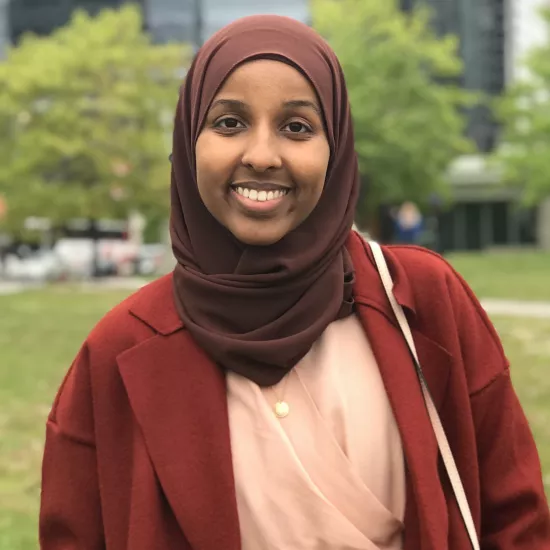
Shukri Nur
-
E-mail:
I am currently a Speech-Language Pathologist (Reg. CASLPO) at Dufferin-Peel Catholic District School Board.
What were your favourite classes?
While I truly enjoyed every class I took as part of the Linguistic Studies Minor, classes related to phonetics and phonology were my favourite! I loved classes such as LIN228 (Phonetics), LIN229 (Sound Patterns in Language), and LIN328 (Acoustic Phonetics). That being said, the first year of Introduction to General Linguistics (LIN101/LIN102) classes will always be special to me as they unlocked the world of linguistics.
How did UTM prepare you for your career?
Being a student at UTM prepared me well for my professional graduate program in speech-language pathology and my career. In addition to the variety of classes offered in the Linguistic Studies program, the small community at UTM allowed me to capitalize on unique experiences, such as the chance to get involved with research early on and make personal connections with faculty members. I also had the opportunity to be a Facilitated Study Group (FSG) leader for LIN101 and LIN102, in which I had to create study session materials and lead sessions for students. The skills that I had acquired as an FSG leader considerably help me in my career as a Speech-Language Pathologist since I am always creating lesson plans and materials for use during sessions with students.
How did you balance your time as a student?
Outside of class and study time, I balanced my time by making an active effort to stay involved on campus. Whether that was joining 1-2 clubs every year, attending on-campus events, or joining different research labs, I made sure to take some time for myself and explore other interests. In between classes and study time, I also spent time with my friends to grab lunch, get something to drink (hello coffee!), and take strolls around campus to enjoy the beautiful view.
What projects or tasks do you perform in a typical week in your current role?
A typical week as a Speech-Language Pathologist (SLP) differs depending on the setting you work in (e.g. hospitals, schools, community clinics, etc.). As an SLP at a school board, I conduct assessments and provide support for students from kindergarten to grade 12 who have speech, language, and communication needs. I work in several schools, but a typical week involves seeing students directly in the classroom or pulling them out of class for individual sessions. Sessions are typically 30 minutes long and target everything ranging from articulation, phonology, fluency (e.g. stuttering), language impairment, and more! I also collaborate with parents and families, teachers, and other professionals on the school team (e.g. psychologists, child and youth works, etc.).
What did you learn in your program that applies to your current role?
The biggest thing that I learned in the Linguistic Studies program that applies to my role as an SLP would have to be the International Phonetic Alphabet (IPA). In my speech sound assessments with students, I always write down (or transcribe) their speech using the IPA. This standard system of transcribing speech prevents confusion and helps me understand which speech sound(s) the student has difficulty with.
